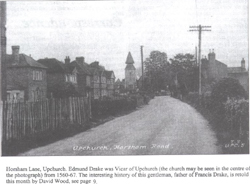THE REAL EDMUND DRAKE, VICAR OF UPCHURCH, 1560-1567
One of the things you will be told about local history when you come to Upchurch is that Sir Francis Drake’s father Edmund was vicar of the village church. Unfortunately little more information is usually given. So who was this man whose son gained world fame as an adventurer and pirate? He certainly was not a conventional priest, as demonstrated by his story of fleeing Devon after criminal activity, living on a shipwreck and then progressing to becoming a village vicar with a wife and twelve children.

Edmund Drake was born into a Devonshire farming family in 1514. He was brought up at Crowndale Farm near Tavistock comprising 157 acres of land, later increased to 191 acres. The family was well off by contemporary standards and the Lay Subsidy Rolls of 1524 showed that Edmund personally possessed four pounds sterling in goods aged only ten.
Edmund became a Shearman in the cloth industry but there was only part time work in Tavistock and he disliked it. After what was believed to be a brief period in farming he decided to enter the clergy. Originally he was a Catholic but after the religious changes made during the reign of Henry VIII he was converted to Protestantism at an early age. Little information is available about his ordination as a vicar but it is known that he became a lay preacher in Devon for a while and was vehemently anti Catholic, a trait that his son Francis inherited.
At about the same time in 1539 he got married and his first child Francis was born. He had twelve children in total. During these years Edmund struggled. He had a family to maintain but was unable to live well on his income as a priest. This was probably because he was unable to get promotion in the clergy because he was married. The church at that time preferred priests to be unmarried and celibate. He also failed to inherit the bulk of his father’s wealth as he wasn’t the eldest child.
According to the English Patent Rolls of 1548 Edmund, with the help of two accomplices, attacked a man named Roger Langiford just outside Tavistock on 16th April 1548. After beating him with staves and swords they stole his purse containing twenty-one shillings and seven pence.
Nine days later Edmund was involved in another incident when he and an accomplice attacked a man named John Harte at Peter Tavy near Tavistock. They stole his horse worth three pounds. However, in December 1548 Edmund was pardoned of both crimes. The reason is not clear but G. Woodcock, a local Devon historian, argues that it was due to influence and money. Edmund’s father knew the Abbot of Tavistock and Lord Russell who later became godfather to Edmund’s son Francis.
Because of the Catholic rebellion in Devon against the imposition of the New English Prayer Book in 1549 Edmund, who may have suffered religious persecution, fled to Plymouth then took refuge in Kent. He found a home in the hulk of an old ship on the banks of the River Medway and became a prayer reader to seamen and shipwrights in Chatham.
Later Edmund applied to the Church authorities in Canterbury to become vicar of Upchurch. He succeeded and took up the position on 25th June 1560. It is not clear how he managed to do this, particularly with regard to his past misdemeanours but influence and his contacts in Devon may have played a part.
At this time the Parish of Upchurch consisted of 40 dwellings and had a population of 250 people. There was also a small port nearby, thought to be at Otterham Quay where six boats were based. Fourteen men from the village worked there and by getting to know them Edmund was able to secure an apprenticeship for his eldest, twelve year old son Francis. Until this time Francis had continued to live in Devon with the family of his cousin John Hawkins who also became a famous seaman.
When he came to Upchurcb Francis did not attend school as Edmund taught him to read and write himself and did his best to give him a basic education. After this Francis obtained work on a small vessel that sailed to Kentish and nearby continental ports. He later inherited the boat when the owner who had taken a liking to him died.
Edmund continued as the vicar of Upchurch until his death in 1567. In such a small, rural village he got to know his parishioners very well and settled quickly. He never returned to Devon. According to his will of 26th December 1566 he requested to be buried in Upchurch churchyard. This request was granted when he died in 1567. Since then he has been remembered as the father of Sir Francis Drake. His name has been given to a housing estate in the village known as ‘Drake’s Close’ but few people in Upchurch know the story of the real Edmund Drake.
From Action Forum, December 2003















































































Comments
RSS feed for comments to this post